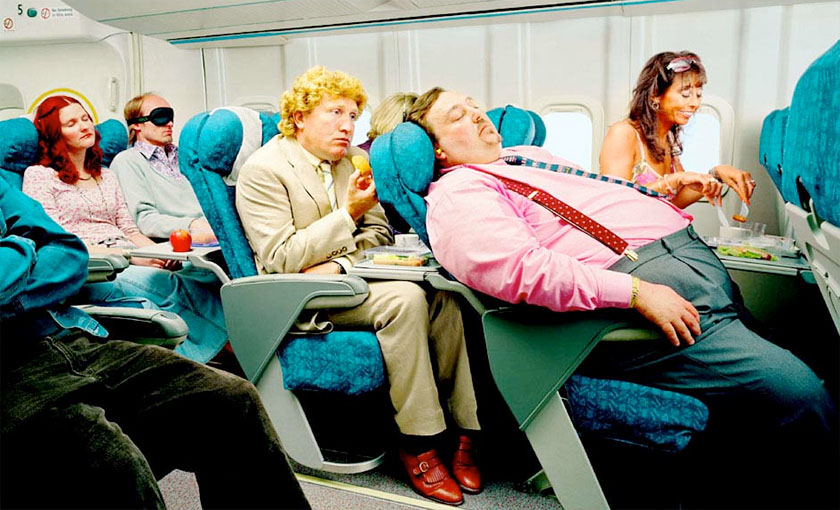Medium blogger Your Fat Friend hates flying in airplanes. It’s not just the stress of researching ticket prices, deciding whether to pay more to check her bag or not, or the dread of standing in security lines. She suffers severe anxiety about flying because she’s fat.
Since the 1970s, airline seats have shrunk from 18 inches to 16 ½. Coach seats used to be 35 inches deep, but now, to save space, they’re a precipitous 31. For ample-bodied souls, the prospect of being crammed into a tight economy row with disgruntled strangers isn’t just uncomfortable–it’s a nightmare.
Air travel is stressful for almost everyone. Especially on long flights, being strapped down in a middle seat can be downright claustrophobic. Emotions are high. Elbows are constricted unnaturally. Such confinement can even be dangerous to your health.
A study by the World Health Organization found that the average person’s risk of developing a blood clot, or deep vein thrombosis, doubles after travel lasting four hours or more. More than 500 passengers get blood clots every day from flying. It’s such a common problem that it even has a name: “Economy Class Syndrome.” It’s real, and the dangers are under-reported.
For many travelers, first class is worth the extra legwork.
Upgrading to premium, business or first class is the easiest way to bypass unnecessary stressors. You can skip to the front of the line at check-in. Attendants will help you with your bags. You get to enjoy reclining seats, more leg room, and complimentary amenities like movies, snacks and sleeping masks. The only problem with flying first class is that it’s incredibly expensive.
To Europe, the costs can vary from $3,000 to $12,000. This is one percent territory. But hey. If you’re going to Europe or China, you’re already getting up there in status. So why not put in the extra 10% for the best experience?
Can you really get discounts on business and first class fares? Absolutely. With a little research and financial savvy, you could be jetting to your destination with all the comforts of first class–and save $2,000 while you’re at it. You just need to know your price.
You may have to be more flexible about travel dates or connecting cities. And you can’t always be choosy about airlines. Usually, you’ll have to buy your ticket through an agency that specializes in first and business class.
Typically, airlines sell bundles of discounted tickets to outside retailers, who then turn around and sell the deals to you. Most of these companies are legitimate, but some of them are scams. You don’t always know what you’re getting yourself into. But if you’re a smart investigator, you can land that golden ticket.
How to spot a legitimate deal:
Looking for discount tickets can be hit or miss. Sometimes you’ll only save a couple of hundred dollars. Sometimes many thousand. But it’s always best to check around.
For domestic flights, business travelers can use this trick: book your economy ticket in “Y class.” Y class give you the option of later upgrading to premium–after your corporate accountant has already approved the expense.
But it’s important to know what you’re looking for because not all that glitters is gold. How do you know if an offer you find online isn’t too good to be true?
There are a few things you can do to determine whether a listing is legitimate. First, you can look the company up in the Better Business Bureau to find out if it’s the real deal.
If you’re looking at a ticket deal that offers a cheaper fare for cash payments, you should probably pay by credit card anyway. It’s better to have a paper trail. Often, the best deals can’t be found online. You have to pick up the phone.
So don’t forget that you can always consult a travel agent. The world of consolidator airfare booking is a crazy patchwork of loopholes and information. It can be difficult to navigate.
There’s no reason to confine yourself to the emergency exit row when you could be napping in first class. Brush up your research skills, and you could be traveling in style–while saving a load of cash.

 Save up to 60% on Business Class. Call 1-800-435-8776
Save up to 60% on Business Class. Call 1-800-435-8776

Leave A Comment